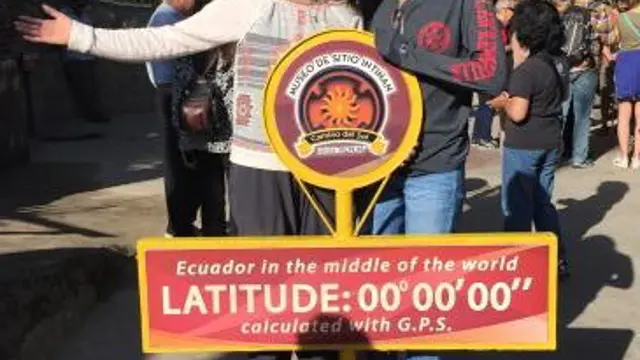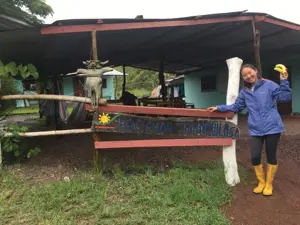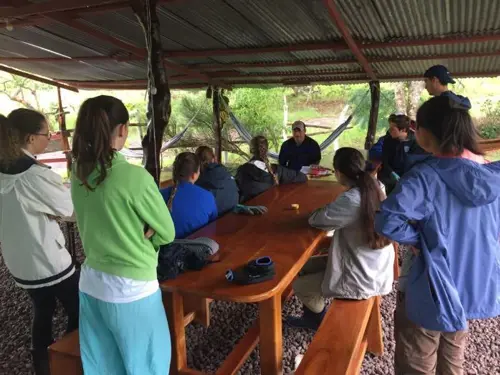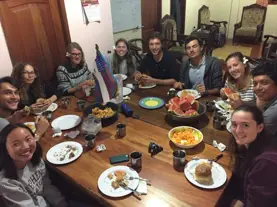Serena’s Experience Living on a Farm in the Galapagos Islands

Part 1: An Unexpected Journey
“Thank you for flying with us today, we are now
beginning our descent to Guayaquil,” stated the flight attendant over the telecom. I whipped my head around to my mom, and we looked at each other with panicked expressions and racing heartbeats. “Oh, shoot,” my mom muttered. “We actually got on the wrong plane to Guayaquil instead of San Cristóbal.” I sat up rigidly in my previously comfortable airplane seat, rolling my lips together nervously, the information slowly sinking in.
Suddenly, the flight attendant’s calm voice interrupted our frenzied thoughts. “If your final destination is San Cristóbal, please remain seated as we will allow
additional passengers from Guayaquil onto the plane,” the flight attendant said. My entire body relaxed into the cushion and all the panic drained from my face. “Oh thank God,” I breathed. The momentary turbulence in my head dissipated.
---
Throughout my farming volunteer quest in the San Cristóbal Island of the Galápagos Islands, I experienced moments like these-of uncertainty and frustration. However, these incidents led to my eventual appreciation for travel’s uncertainties, and my acceptance of the unpredictable nature of life.
We arrived at the Hacienda Tranquila on a Sunday afternoon. It was drizzling, and tranquil, just like the farm’s namesake. As I exited Giovanni’s (the farm manager) truck (the car of choice in the Galápagos), I gazed beyond the dilapidated gate to the Hacienda in front of me. Multiple frayed and faded hammocks hung suspended along the sides of the long tin roof. Bulging bundles of bananas patterned in a green to yellow gradient hung down from the roof, practically asking to be plucked. Plain, sky blue cabins bordered the tin roof. Here I stood surveying my home for the next two weeks, on a farm in the middle of an island, 3,000 miles from my actual home. My prospects were laughable: a Chinese American teenager on a farm in the middle of the Galápagos? For a moment, I wondered why of all places, I was here. But, as I would throughout the next two weeks, I swallowed the large pill of my fate.

Figure 1 Standing at the entrance to the Hacienda on my first day at the farm. With all of the fresh bananas around me, I just had to pose with bananas!
My eyes peeled open to the sound of my beeping phone alarm, but I hadn’t actually been sleeping the entire time. Around 5am, the birds outside my window had made it a point to let everyone know that they had woken up, and the wind and rain pounded against the thin tin roof above my room endlessly.
After getting ready for the day and eating a light breakfast (with bananas that I plucked from the bundle), all of the farm’s volunteers gathered around the wooden table under the roof to hear Giovanni’s briefing on the day’s tasks. Our group included college students from France, America, and the UK, a woman from Germany, and a woman from Australia. As the youngest volunteer, and one out of two non-Caucasians in the group (my mom being the other), I felt out of place instantly. However, in the next two weeks, I would learn and be inspired by those around me.
The morning task was to hike up to a neighboring farm and plant grass for the cows. The instructions sounded reasonable, but the rain and sticky humidity made our work much more difficult. My job was to plant tufts of grass in the holes that other volunteers dug. Now, dropping grass into holes sounds easy. However, the work was backbreaking, and each time I rose from planting the grass, my eyesight would go dark and spotted, giving me a mini headache. The planting also proved extremely monotonous. I sweated in the humidity, repeating the same motions over and over again. Warm sweat beaded down my forehead, only to be greeted by cold rain that washed off of my skin. Exhaustion and soreness ran through my body.
After two hours of planting, I rose from a hole, frustrated by my constant headaches and tired by the work. “Why am I doing this? What purpose does this serve?” I wondered. I once again questioned why I had chosen to spend two weeks out of my short summer break volunteering on a farm far from home. “You expected this, right Serena?” my mom asked. But, in truth, I hadn’t formed any expectations before embarking on this trip, because I had no idea what to expect. I couldn’t quite put my finger on why I had wanted to put myself through the pain and boredom of farming. Yes, I certainly wanted to serve the community and explore the fascinating place that was the Galápagos Islands. But I was searching for something else; I didn’t know what.
Part 2: It’s the People
As I spent more time at the Hacienda Tranquila, I grew accustomed to waking up to the sound of birds tapping at my tin roof, the exhausting farm labor, and the quiet afternoons of reading in a hammock. Every day proved difficult, but rewarding. But one of my main takeaways from my experience at the farm was getting to know the other volunteers.

Figure 1 Volunteers gathering for our twice-daily meetings with Giovanni, the farm manager
All of the volunteers were either college students or adults, so it was interesting and enjoyable to spend two weeks surrounded by people who were older than me and had many fascinating experiences and ideas to share.
Eve (names have been changed to protect privacy) was taking a yearlong sabbatical from her stable office job to travel and explore her passions. Upon returning a year later, she had decided to quit her job and chase her dream of working with sharks. Other volunteers and travelers I met in the Galapagos Islands had similarly left their jobs to travel, and many had no plans of returning home soon. Their goals were similar–they desired a change from their routine lives and yearned for some significant soul-searching.
To my mom’s relief, meeting Eve and others did not inspire me to drop out of high school to travel. But, the other travelers’ willingness to embrace uncertainty struck a chord in me. Their ability to drop everything that they had built up at home and start afresh in a foreign country, along with their positivity about their futures taught me to have faith in second chances in life. Their ideas and life journeys were unconventional, and vastly different from the traditional route to success that had been ingrained into my mind from a young age.
One night, all of the volunteers were sitting around the table for dinner, when the topic of the World Cup arose. Jokingly, my mom and I mentioned that we should have a reunion during the next World Cup, as we (mistakenly) thought that it would be held in America. “Wow,” I said. “I’ll be in college by then, an actual adult.” Janice, a woman who had quit her job a month ago, responded, “Maybe not, maybe you’ll decide that college isn’t worth it anymore. Who knows?” My mom raised her eyebrows and wagged her finger, to which all of the other volunteers chuckled. But, the others’ mindset that there is no one path to success and to a happy, fulfilling life provided me with a new and refreshing mentality towards my future.

Figure 2 Volunteers eating dinner together